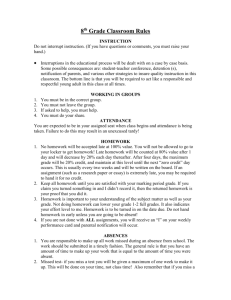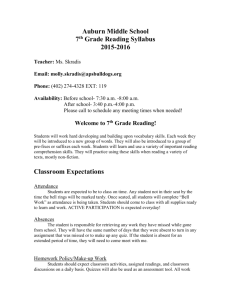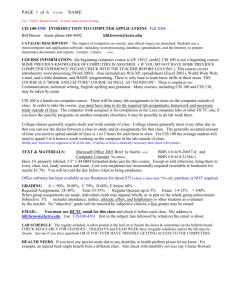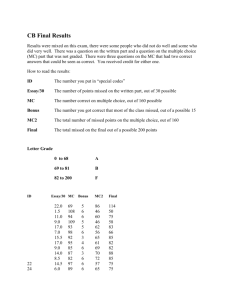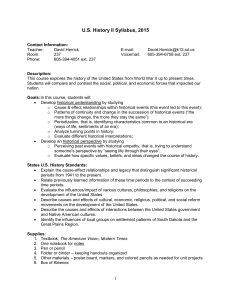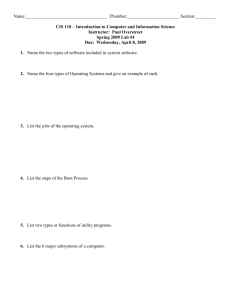CIS 100 4702 BBrown Spring 2005
advertisement
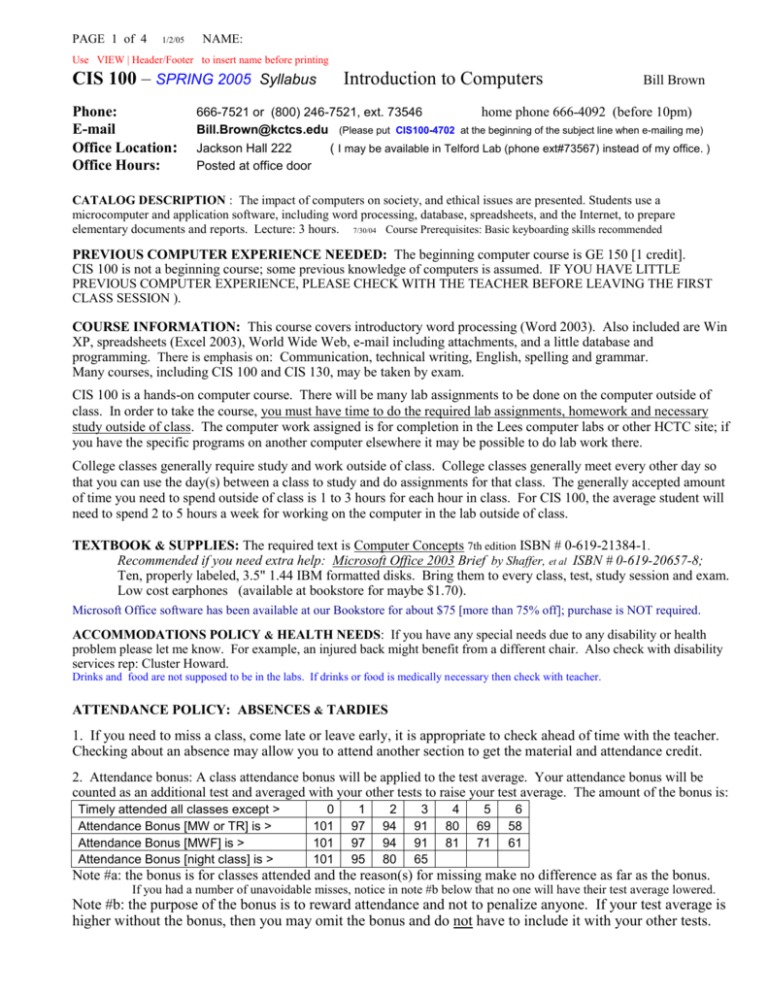
PAGE 1 of 4 1/2/05 NAME: Use VIEW | Header/Footer to insert name before printing CIS 100 – SPRING 2005 Phone: E-mail Office Location: Office Hours: Syllabus Introduction to Computers Bill Brown 666-7521 or (800) 246-7521, ext. 73546 home phone 666-4092 (before 10pm) Bill.Brown@kctcs.edu (Please put CIS100-4702 at the beginning of the subject line when e-mailing me) Jackson Hall 222 ( I may be available in Telford Lab (phone ext#73567) instead of my office. ) Posted at office door CATALOG DESCRIPTION : The impact of computers on society, and ethical issues are presented. Students use a microcomputer and application software, including word processing, database, spreadsheets, and the Internet, to prepare elementary documents and reports. Lecture: 3 hours. 7/30/04 Course Prerequisites: Basic keyboarding skills recommended PREVIOUS COMPUTER EXPERIENCE NEEDED: The beginning computer course is GE 150 [1 credit]. CIS 100 is not a beginning course; some previous knowledge of computers is assumed. IF YOU HAVE LITTLE PREVIOUS COMPUTER EXPERIENCE, PLEASE CHECK WITH THE TEACHER BEFORE LEAVING THE FIRST CLASS SESSION ). COURSE INFORMATION: This course covers introductory word processing (Word 2003). Also included are Win XP, spreadsheets (Excel 2003), World Wide Web, e-mail including attachments, and a little database and programming. There is emphasis on: Communication, technical writing, English, spelling and grammar. Many courses, including CIS 100 and CIS 130, may be taken by exam. CIS 100 is a hands-on computer course. There will be many lab assignments to be done on the computer outside of class. In order to take the course, you must have time to do the required lab assignments, homework and necessary study outside of class. The computer work assigned is for completion in the Lees computer labs or other HCTC site; if you have the specific programs on another computer elsewhere it may be possible to do lab work there. College classes generally require study and work outside of class. College classes generally meet every other day so that you can use the day(s) between a class to study and do assignments for that class. The generally accepted amount of time you need to spend outside of class is 1 to 3 hours for each hour in class. For CIS 100, the average student will need to spend 2 to 5 hours a week for working on the computer in the lab outside of class. TEXTBOOK & SUPPLIES: The required text is Computer Concepts 7th edition ISBN # 0-619-21384-1. Recommended if you need extra help: Microsoft Office 2003 Brief by Shaffer, et al ISBN # 0-619-20657-8; Ten, properly labeled, 3.5" 1.44 IBM formatted disks. Bring them to every class, test, study session and exam. Low cost earphones (available at bookstore for maybe $1.70). Microsoft Office software has been available at our Bookstore for about $75 [more than 75% off]; purchase is NOT required. ACCOMMODATIONS POLICY & HEALTH NEEDS: If you have any special needs due to any disability or health problem please let me know. For example, an injured back might benefit from a different chair. Also check with disability services rep: Cluster Howard. Drinks and food are not supposed to be in the labs. If drinks or food is medically necessary then check with teacher. ATTENDANCE POLICY: ABSENCES & TARDIES 1. If you need to miss a class, come late or leave early, it is appropriate to check ahead of time with the teacher. Checking about an absence may allow you to attend another section to get the material and attendance credit. 2. Attendance bonus: A class attendance bonus will be applied to the test average. Your attendance bonus will be counted as an additional test and averaged with your other tests to raise your test average. The amount of the bonus is: Timely attended all classes except > Attendance Bonus [MW or TR] is > Attendance Bonus [MWF] is > Attendance Bonus [night class] is > 0 101 101 101 1 97 97 95 2 94 94 80 3 91 91 65 4 80 81 5 69 71 6 58 61 Note #a: the bonus is for classes attended and the reason(s) for missing make no difference as far as the bonus. If you had a number of unavoidable misses, notice in note #b below that no one will have their test average lowered. Note #b: the purpose of the bonus is to reward attendance and not to penalize anyone. If your test average is higher without the bonus, then you may omit the bonus and do not have to include it with your other tests. PAGE 2 of 4 1/2/05 NAME: 3. It is not necessary to tell the instructor why you missed, although that is encouraged as appropriate and professional. Out of concern for you, I am interested in the general reasons for absences and appreciate your letting me know. I am especially concerned if there is a problem that I might be able to help resolve. Email is one way to communicate this information. Occasionally reasons of “Private” or “None ” may be appropriate. 4. Another reason to check with me about an absence before the next class is to find out the material and assignments everyone is responsible for at the next class. Sometimes an extension of time on the material and assignments you are responsible for at the next class would be possible and helpful to you. I generally give extensions by email so the extended due date will be clear. 5. A quiz missed for any absence or tardy is zero (note however that extra credit can regain missed points). 6. When a short quiz is in progress at beginning of class, tardy students will normally wait in hall. 7. If a student who has come in tardy will check at the end of class, I will be glad to change the absence to tardy. Please let me know if a tardy was unavoidable or for a good reason. 8. End of Daily Class: It is inappropriate and unprofessional for a student to leave a class before being dismissed. In CIS 100, if the instructor is not speaking, you may consider yourself automatically dismissed when the class time is fully up. In my classes, if I am speaking overtime by more than a couple of minutes, I appreciate your bringing the time to my attention. If the class is working individually on the computer, and you have reached a stopping point during the last five minutes of class, you are welcome to ask about leaving. 9. Missed Tests: (a) Test missed due to official school trips may be made up in full. (b) A test scheduled in advance with the teacher to be taken with another section is not considered missed. (c) Students may drop their lowest test grade. If a test is missed for any reason [other than official school trip], then that will be the test grade that is dropped and no makeup is necessary or allowed. A second test missed may be 80% or 90% made up IF the email procedure given below is done within two days of return to school. (Rather than a makeup test, the teacher may optionally choose to assign a grade for the test based on 85% of student's average on all other tests) . Note a: Doctor's excuse or equivalent: 90% make up test. Other missed tests: 80% makeup. Note b: Within three days of return to school, the student must email me with “MAKEUP TEST” as the subject. The student should suggest 3 possible makeup times based on my office or class hours. Save my reply as "proof" of your sending. Note c: [Untimely, late, delayed requests for makeups may be refused or given at much reduced credit] WITHDRAWAL POLICY: Official withdrawal at any time before the last class will receive a grade of W. NOTE: If a student officially withdraws from all classes before 60% of the semester [November/April] or if a student quits coming to all classes and gets all E's, then Federal Financial Aid must be repaid to the government. If a student officially withdraws from one classes such as CIS 100 with a grade of W after the 60% time, then no repayment. ACADEMIC HONESTY POLICY: The KCTCS faculty and students are bound by principles of truth and honesty that are recognized as fundamental for a community of teachers and scholars. The college expects students and faculty to honor, and faculty to enforce, these academic principles. The college affirms that it will not tolerate academic dishonesty including, but not limited to, violation of academic rights of students (section 2.0) and student offenses (section 3.0). Information about student academic rights, offences, the appeals process, etc. is in ARTICLE II of the KCTCS Code of Student Conduct can be accessed at www.kctcs.edu/student/code.htm. Students can request a hard copy of the Code from the Student Affairs Office. CHEATING or COPYING: I feel very strongly about cheating and copying. E will be given. Copying due to one student lending their disk files to another student will be considered cheating by both students. Even if the name is changed from your name to their name it is still cheating. Helping each other with homework is encouraged; tell someone which keys to type - don't type it for them. PAGE 3 of 4 1/2/05 NAME: GRADING SCALE: A = 90%, B 80%, C 70%, D 60%, E below 60% GRADING POLICY: Assignments 28-30% Tests 53-55% Regular Quizzes up to 5% Exam 14-15% = 100% When group assignments are made, individual credit may depend wholly or in part on the whole group achievement. Subjective 5% includes attendance, tardies, attitude, effort, and helpfulness to other students as evaluated by the teacher. No "objective" grade will be lowered by subjective criteria; a few grades may be raised. ASSIGNMENTS: Late work will generally be accepted with a lowered grade. If there is good reason for the lateness, then let the teacher know for possible full credit. Test questions are often taken from the lab work. To be prepared for tests your work needs to be done on time so it can be graded and returned to you. All disk files must use the file-name specified for the file. All disk files must be available throughout the semester, during the last week of class and during the final exam to receive the full credit; credit previously assigned is tentative until semester end. In case of difficulties be sure to ASK for HELP. Tutoring or help is available. TESTS, QUIZZES, FINAL EXAM: Typically there are four tests during the semester plus a final exam. Tests will be scheduled in advance. Quizzes will be "pop". The Final Exam Test will be comprehensive; students with an A average will probably have an optional exam project for their exam. (Check late in the semester with me for info on exam project and whether you are eligible). See info on missed tests. During a quiz or test, unless announced otherwise, you may "legally" use one 4" x 6" (or smaller) card (or paper) in your own original handwriting. The top half-inch of the card on both the front and back sides should have nothing but your name in half-inch high letters. Two cards may be used for the final exam. Quizzes may be given as Extra Credit Quizzes that can count extra on tests or as Regular Quizzes. Keep all returned quizzes, tests, classwork, labwork/homework, etc. until the semester grade has been received. EXTRA CREDIT can raise grades! For most Extra Credit you must ask the teacher. ASSIGNMENTS ARE AVAILABLE UPON REQUEST. Very occasionally I will announce extra credit opportunities. They normally count as one to three points added to your next test. Check on by early or mid-course ( they count less later in the semester). CLASS PROCEDURES: Quiz papers are often exchanged between students to be marked for instant feedback; teacher will do the actual grading. Graded labwork/homework papers being returned will be placed in a class 'out-box' for students to pickup. Test papers being returned will be returned directly to students who are present; otherwise the tests will be placed in the class 'out-box'. If you have any objection to these procedures, please discuss privately with the teacher so that alternate procedures can be used. EMAIL: You must use KCTCS email for this class and check it before each class. My address is bill.brown@kctcs.edu Use CIS100-4702 first in the subject line followed by whatever the email is about. WEB SERVER: The class web server address is 216. 69. 35. 8 . Assignments, study guides, and class info will be posted. Occasionally class times may be shortened or omitted in order for students to work on their web work. Check the web server before each class. TEACHER AVAILABILITY I can often be available to you at times in addition to office hours; check by the office or make an appointment. I keep my office hours in either Jackson Hall #222 or in Telford Lab. My office is Jackson Hall #222, phone ext#73546; I may be available in the Lab (phone ext#73567) instead of my office. I will be glad to talk with you about whatever concern or interest you might have; it does not have to be something "major". You are welcome to check with me on a "drop-by" basis during office hours and also during numerous other times that I am in the office or Lab. I will also be glad to make an appointment, either during office hours or some other time that would be more convenient for you. Please do let me know if you are having any difficulty in "catching up" with me; I really do wish to be available to you. Feel free also to call me at home, 666-4092, before 10 or 10:15 PM. PAGE 4 of 4 1/2/05 NAME: COURSE TOPICS: WORD PROCESSING WINDOWS INTERNET EMAIL including attachments FILE MANAGEMENT SPREADSHEETS PROGRAMMING POWER POINT DATABASE, RECORDS, FIELDS TOPICS from COMPUTER CONCEPTS. Text chapters will generally have material added and omitted. When chapter study guides are given, follow the guide not the text itself. GENERAL EDUCATION COMPETENCIES Strong reading and writing skills are necessary for successful completion of all college general education courses. The KCTCS 2004-2005 Catalog states that upon completion of an associate degree the graduate will be able to: Communicate effectively using standard written English; Communicate in a clear oral and non-verbal fashion and employ active listening skills; Demonstrate basic skills in computer operations and/or software applications; Organize, analyze, and make information useful by employing mathematics; Demonstrate an awareness of one's interaction with the biological/physical environment; Demonstrate an awareness of self as an individual, as a member of a multicultural society including the world community; Recognize the impact of decisive ideas and events in human heritage; Develop and perform basic search strategies and access information in a variety of formats, print and non-print; Analyze, summarize, and interpret a variety of reading materials; Think critically and make connections in learning across the disciplines; Elaborate upon knowledge to create new thoughts, processes, and/or products; and Demonstrate an awareness of ethical considerations in making value choices. COURSE COMPETENCIES On Completion Of This Course Most Students Can: Use Microsoft Word 1. create, save, print, modify, spell-check, and grammar-check a simple document.; 2. enhance the appearance of a simple document by using centered, right-justified, boldfaced, underlined, and italicized text. 3. change the default margins and line spacing; 4. create document headers, footers, and footnotes; Use Excel 5. create, save, print, modify and obtain graphs from a simple spreadsheet. 6. perform basic math operations including addition, subtraction, multiplication, and division; 7. calculate averages and percents; 8. Enhance the appearance of a spreadsheet by changing fonts, foreground and background colors and centering text across columns; Use Access 9. create, maintain, and print reports from a simple relational database; 10. creating and maintaining forms and reports; 11. create queries tables using basic query operations; Other 12. Print in landscape and portrait orientations; print part of a document including individual pages; 13. Use the component of the operating system that helps the user manipulates files and folders to copy, move, rename, and delete folders; 14. Use a Web browser to navigate hypertext documents and to download files; 15. Use Internet search engines and understand their advantages and disadvantages; 16. Send and receive email including attachments; 17. Discriminate between ethical and unethical uses of computers and information; 18. Understanding basic issues regarding software copyright, software licensing, and software copying; 19. Demonstrate an awareness of computer viruses and a basic understanding of ways to protect a computer from viruses; 20. Understanding basic issues of the impact of computers on society including privacy issues, identity theft, computer fraud; 21. Use and understand basic computer terminology. 22. Prepare a simple PowerPoint presentation. 23. Use and explain proper backup procedures. 24. Understands and demonstrates the importance of use exact names as given or specified for web locations, email, and files.

